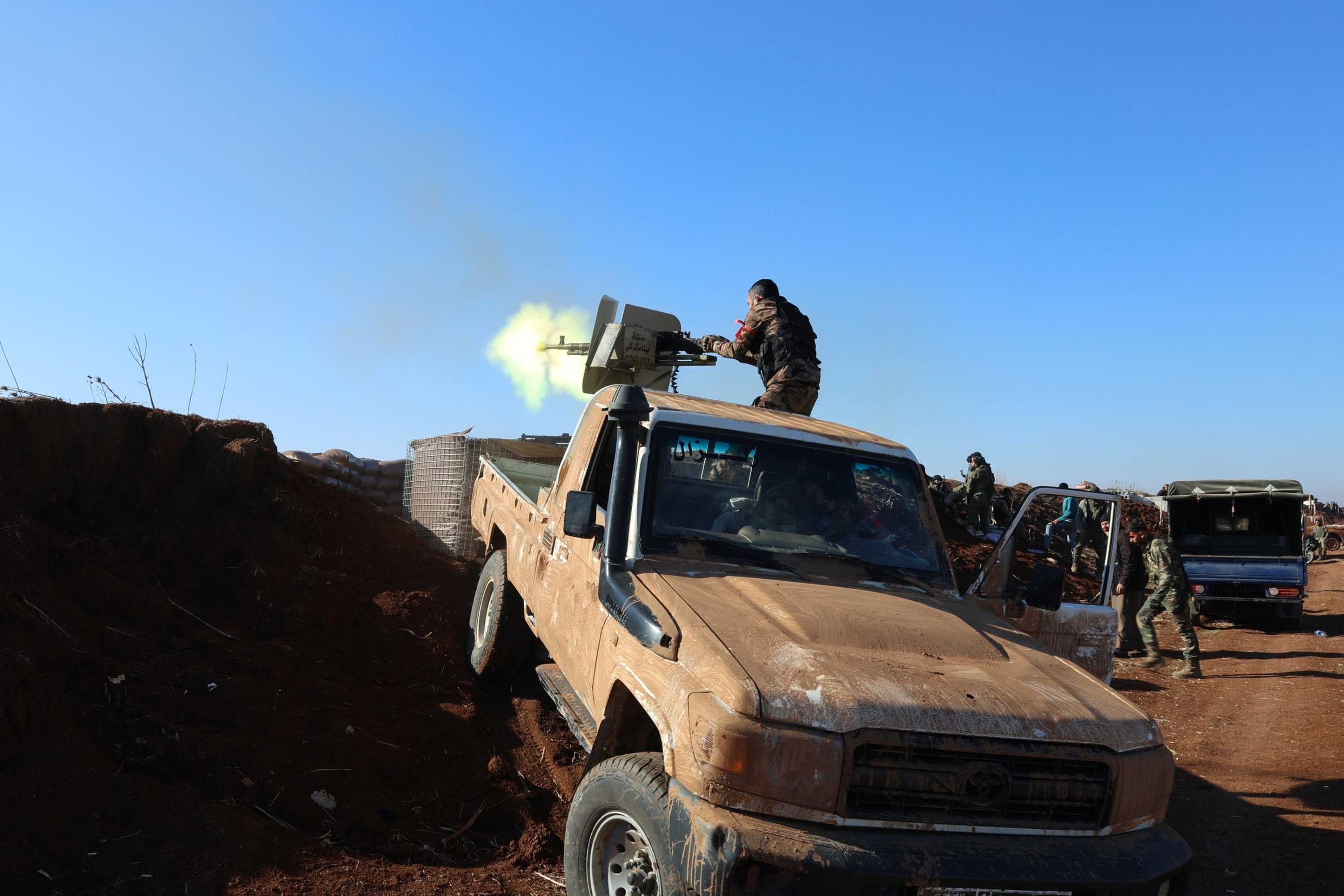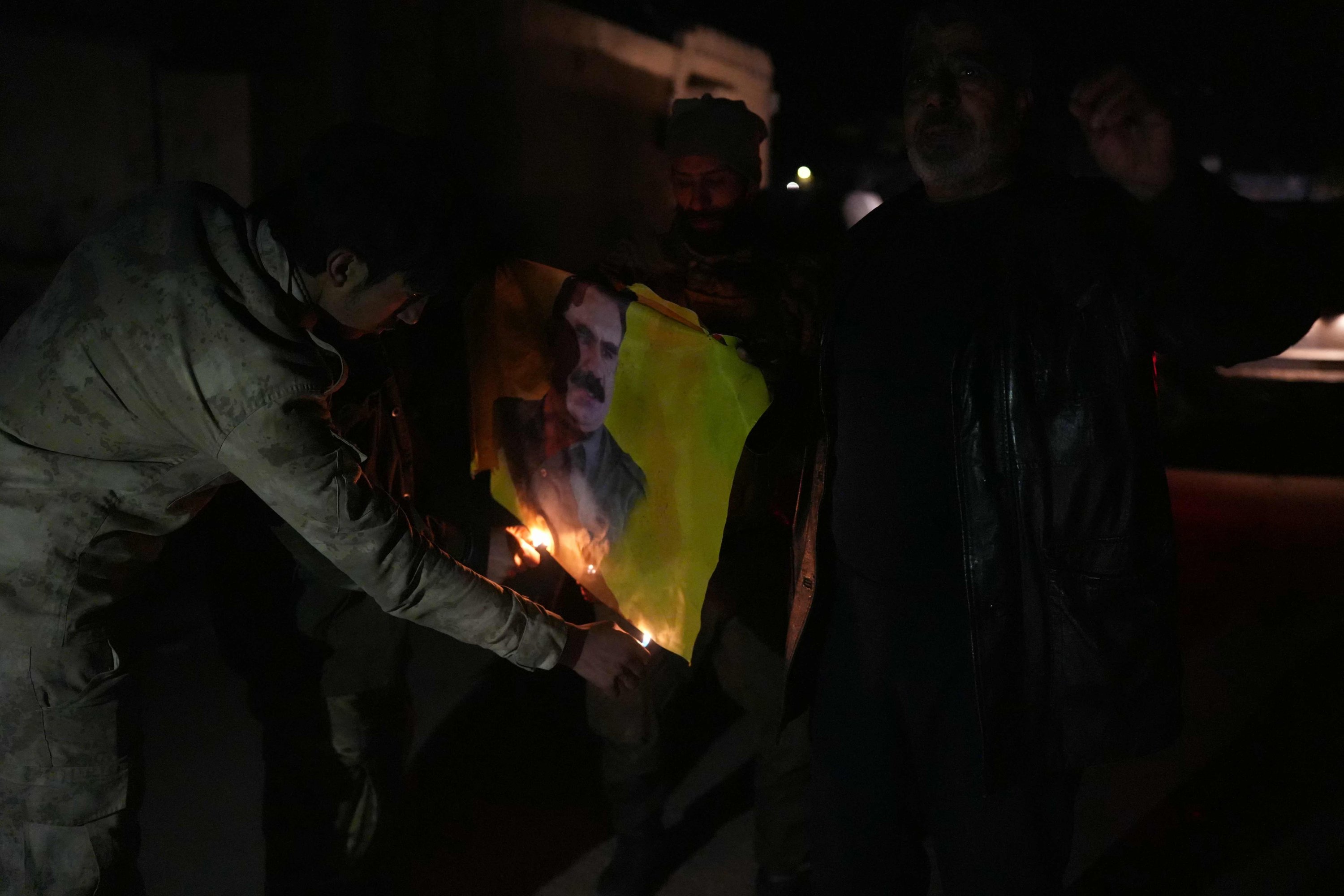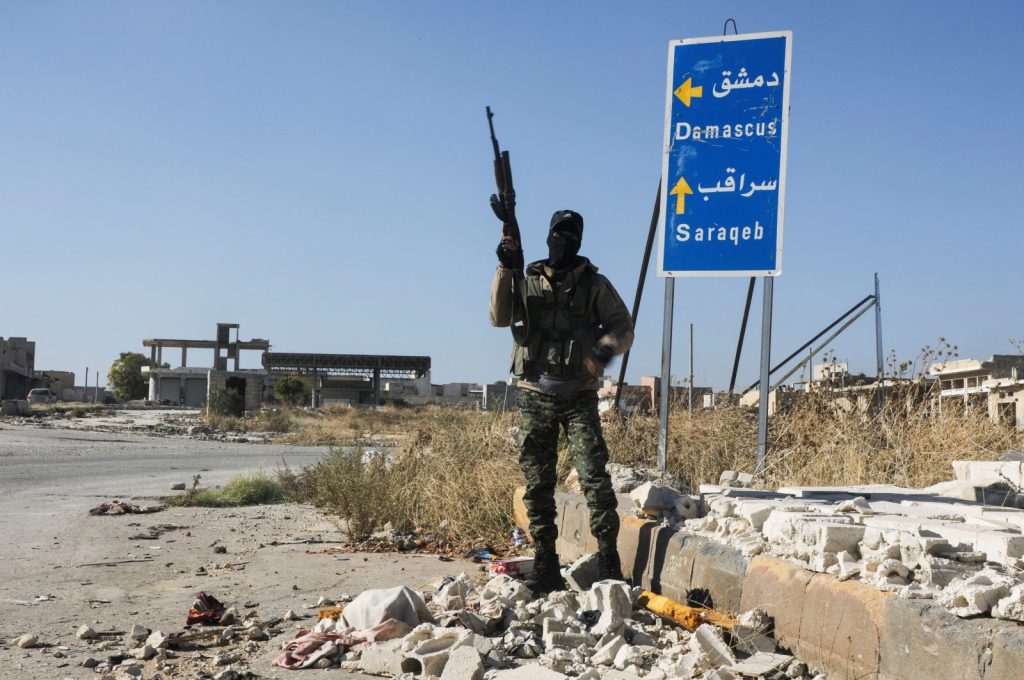An all-out push to capture the key Syrian province of Aleppo and more towns by anti-regime forces and efforts by the Syrian opposition to thwart the capture of towns by the terrorist group PKK/YPG revived the frozen conflict in the war-torn country.
Since last week, forces led by Hayat Tahrir al-Sham (HTS) claimed several territorial gains in their lightning offensive that primarily targeted Aleppo. Aleppo apparently fell into their control on Sunday with forces loyal to the Assad regime retreating. Elsewhere, the Syrian National Army (SNA) of the opposition, managed to capture Tal Rifaat where the PKK/YPG sought to establish a “terror corridor” by linking it to northeastern Syrian towns it controls after the HTS-led forces’ gains.
Rescue service White Helmets said on Monday that at least 25 people were killed in northwestern Syria in airstrikes carried out by the regime forces and Russia.
Russian and regime jets struck the city of Idlib held by anti-regime forces in northern Syria on Sunday, military sources said, as Bashar Assad vowed to crush “terrorists” who had swept into the city of Aleppo. Regime forces also said it had recaptured several towns that the opposition had overrun in recent days.
Residents said one attack hit a crowded residential area in the center of Idlib, the largest city near the Turkish border where around 4 million people live in makeshift tents and dwellings.
At least seven people were killed and dozens injured, according to rescuers at the scene. The Syrian regime’s forces and its ally Russia say they target the hideouts of anti-regime groups and deny attacking civilians.
Ten children were among the dead in the airstrikes in and around Idlib and other targets in territory held by anti-regime forces near Aleppo on Sunday, according to the White Helmets. The total death toll from Syrian regime and Russian strikes since Nov. 27 had climbed to 56, including 20 children, the group added in a statement on X.
In a joint statement, the United States, France, Germany and Britain urged “de-escalation by all parties and the protection of civilians and infrastructure to prevent further displacement and disruption of humanitarian access.” U.N. Special Envoy Geir Pedersen stated that a lack of commitment to a peace solution in Syria has resulted in the renewed escalation of violence in the country’s long-running civil war. “What we see in Syria today is a mark of a collective failure,” said the Syria mediator. Pedersen said he has repeatedly warned of the risk of escalation and the danger of relying on conflict management instead of conflict resolution. The recent developments pose a threat not only to the Syrian civilian population, but also to regional and international security, he added. The Norwegian diplomat also urged the Syrian conflict parties and involved states to engage in negotiations.
Anti-regime forces seized control of all of Idlib province in recent days, the boldest assault for years in a civil war where front lines had largely been frozen since 2020.
They later swept into the city of Aleppo, east of Idlib, on Friday night, forcing regime forces to redeploy.
In remarks published on regime media, Assad said: “Terrorists only know the language of force and it is the language we will crush them with.” The regime forces said dozens of its soldiers had been killed in the fighting in Aleppo.
Assad received Iranian Foreign Minister Abbas Araghchi on Sunday. Before their meeting, Araghchi expressed Iran’s firm support to the regime. Syrian regime sources said on Monday that Iranian-backed militias entered Syria overnight from Iraq and were heading to northern Syria to beef up beleaguered Syrian regime forces. Dozens of Iran-aligned Iraqi Hashd al-Shaabi fighters from Iraq crossed into Syria through a military route near the al-Bukamal crossing, a senior Syrian regime military source told Reuters.
“These are fresh reinforcements being sent to aid our comrades on the front lines in the north,” the officer said, adding the militias included Iraq’s Katiab Hezbollah and Fatemiyoun groups.
Iran sent thousands of Shiite militias to Syria during the Syrian war and, alongside Russia with its air power, enabled Assad to crush the opposition and regain most of his territory. A lack of that manpower to help thwart the anti-regime onslaught in recent days contributed to the speedy retreat of Syrian regime forces and withdrawal from Aleppo city, according to two other sources from the Assad regime forces. Militias allied to Iran have a strong presence in the Aleppo area.
‘Dawn of Freedom’
Some 35 kilometers (21.75 miles) north of Aleppo, another decisive battle was fought by the opposition forces not aligned with HTS. The Syrian National Army’s SNA “Dawn of Freedom” operation launched last week saw the forces taking several villages and two airports and ultimately, taking over the central part of Tal Rifaat from the terrorist group YPG/PKK. Security sources said the Syrian regime handed over parts of the region to the terrorist group during the advance of anti-regime forces toward Aleppo. The terrorist group transported reinforcements from an area east of the Euphrates River toward Aleppo and started building a corridor between Tal Rifaat and Manbij.

The terrorist group captured Tal Rifaat in February 2016 and displaced some 250,000 civilians, forcing them to take shelter in areas near the Turkish border. Since then, Tal Rifaat has been a launchpad for the terrorist group’s attacks targeting Turkish troops and opposition forces in Syria’s north liberated from terrorist groups with the aid of the Turkish army.
SNA also announced that it captured 33 Assad regime soldiers during operations on the Aleppo-Raqqa highway as part of Dawn of Freedom.
Ferhat Abdi Şahin, ringleader of the YPG/PKK said in a statement on Monday that its members in northwestern Syria were facing intense attacks on multiple fronts. He acknowledged that SNA’s operations “disrupted” what he called “a humanitarian corridor” between northeastern Syria and Tal Rifaat northwest of Aleppo.
Turkish Foreign Minister Hakan Fidan told U.S. Secretary of State Antony Blinken on Sunday in a phone call that Türkiye would not allow terrorist threats targeting its security or Syrian civilians, Turkish diplomatic sources said.
Joy in Tal Rifaat
Locals displaced by the YPG/PKK started flowing into the town after the SNA’s victory. They cheered the operation as they served desserts and coffee to each other. Ahmed Allito, one of the returnees, told Anadolu Agency (AA) late Sunday that it had been eight years and returning home was “an emotion I cannot describe.” “I hope all Syrians will return home one day,” he said.
Khaled Khallak, a local serving treats to passersby, said he settled in Azaz in northern Syria after leaving Tal Rifaat and “immediately hit the road” once he heard about liberation. Others hugged their relatives and friends who lived in the town under PKK/YPG control.

On Saturday, Abdurrahman Mustafa, head of the Syrian National Coalition told the Turkish broadcaster A Haber that Assad was “exhausted” of resources, but they faced the danger of the PKK taking advantage of the situation and dividing Syria. “We dealt a blow to Assad-PKK cooperation with our operation,” he said.
Since 2015, the PKK/YPG has occupied several Syrian provinces, including Arab-majority Deir el-Zour, a resource-rich region bordering Iraq, bisected by the Euphrates River and home to dozens of tribal communities. The terrorist group has forced many locals to migrate, bringing in its members to change the regional demographic structure, conducting arbitrary arrests, kidnapping children of local tribes for forced military recruitment and assassinating tribe leaders to yoke local groups. It has also seized the region’s oil wells – Syria’s largest – and smuggles oil to the Syrian regime, despite U.S. sanctions, to generate revenue for its activities.


